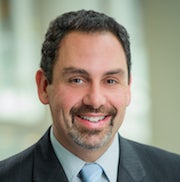
When Bloomberg News reporter Alex Nussbaum covered the 2014 United Nations Climate Change Conference in Lima, Peru, he searched for stories about people, not policy.
“I try to keep things on the human level and dwell on impacts that readers can relate to,” said Nussbaum, an alumnus of Metcalf Institute’s 2002 Annual Science Immersion Workshop for Journalists. “Our most popular stories were ones that cut through mind-numbing diplomatic maneuvering over this phrase or that clause, and instead got to the heart of the matter: conflict between rich and poor nations over who should lead on climate.”
It’s an approach he applies to other environmental stories as well.
“Last year, we wrote a story about rising sea levels in Louisiana and we centered it on a geologist who’d come under attack from state officials and the oil industry for highlighting the damage to coastal marshes caused by decades of drilling and dredging,” he explained. “We told [the geologist’s] story and let the tale of sea-level rise ride along with it.”
A graduate of Cornell University, Nussbaum began his journalism career at the Pottsville Republican in eastern Pennsylvania. After a stint as an environment reporter for The Record of Hackensack, New Jersey, during which time Nussbaum reported on the Ford Motor Company’s “Toxic Legacy” with a team that won the first Grantham Prize for Reporting on the Environment, he joined Bloomberg News in 2008. Now, he focuses on climate change, science, policy and, politics, and the intersection between energy and the environment.
A native New Yorker who loves the outdoors, Nussbaum has always been attracted to environment stories. “Environmental issues affect us all–the air we breathe, the water we drink–and often the most vulnerable people are the ones with the least power to avoid the effects,” he said. “I think those are the kinds of issues journalists have a responsibility to cover. That’s what we’re here for.”
Nussbaum’s desire to better understand and interpret scientific data, spend time in the field with researchers, and network with other journalists led him to Metcalf Institute. His time on Rhode Island’s Narragansett Bay during Metcalf’s Annual Workshop for Journalists gave him “the confidence and understanding to ask difficult questions of scientists.”
“The ability to unpack the science for a lay audience is so important,” he said.
As for the future, he said hopes to do more thoughtful, in-depth stories about climate change. He’ll be heading to Paris later this year for the 2015 U.N. climate talks, from which we can expect more people-centered stories by Naussbaum about this complex scientific topic.
Read More Alumni Profiles